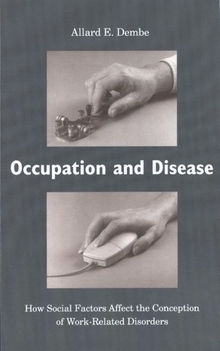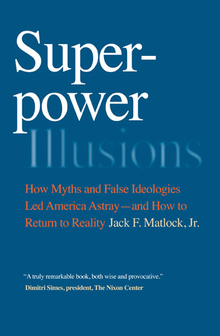Occupation and Disease
WARNING
You are viewing an older version of the Yalebooks website. Please visit out new website with more updated information and a better user experience: https://www.yalebooks.com
How Social Factors Affect the Conception of Work-Related Disorders
Allard E. Dembe
According to Dembe, physicians may be influenced by such social factors as: the advent of new technologies (computers replacing typewriters, for example); passage of laws establishing workers' compensation; union campaigns and labor activism; public outcry against environmental hazards; cultural stereotyping (some complaints of hearing loss, for example, have been linked to "nervous tendencies" of women); medical specialization and competition (diagnosis of back pain as a traumatic injury corresponded with the growth of orthopedics after World War I); and media attention. Dembe contends that physicians have been forced to act as society's "gatekeepers"—referees in controversies having significant implications for labor relations and the industrial economy. He maintains that physicians should instead be free to concentrate on the health of patients and suggests alternative methods for conferring appropriate medical benefits and ensuring protection against occupational hazards.
"Dr. Dembe has articulated in a clear understandable format, a complicated and often confusing subject. Provides the "why" answers to questions that senior management has been asking for years. Must reading for students and practicing safety and health professions."—Jerry Scannell, President, National Safety Council
"An outstanding and revealing contribution to the field of occupational health. This is the kind of book that can help you to view important issues in a new way. Dr. Dembe's historical discoveries might change some minds."—Michael Silverstein, M.D., M.P.H.
"A fascinating account of how physicians and society come to recognize emerging diseases. Beautifully illustrated with splendid historical examples."—Philip J. Landrigan, M.D., Ethel H. Wise Professor and Chair, Department of Community Medicine
"The important and fascinating story of occupational diseases has too often been overlooked. In a study that is sophisticated in method and rich in empirical materials, Allard E. Dembe does much to redress that neglect. Particularly illuminating is his thematic emphasis upon the social factors that not only produce the illness condition but also result in the framing of the disease concept. Occupation and Disease is a major contribution to the historical sociology of industrial illness."—Roy Porter, Wellcome Institute for the History of Medicine
"Using a sophisticated blend of sources from such fields as medical, labor, and social welfare history, Dembe describes the eclectic mix of forces that have created professional and public awareness of occupational illnesses. . . . Dembe nicely accomplishes his goal of showing how social factors affect the conception of work-related diseases."—Science
"An extensive review of the literature and an authoritative style makes this a scholarly and occasionally controversial work."—Philip Merivale, Nursing Times
"This book addresses occupational medicine and is most relevant to those providers involved with occupational health and disease. Professionals providing disability management to business and industry will find this book adds to their understanding of work-related disorders. Personally, this reviewer found the conception of work-related disorders as a complex social phenomenon to be fascinating, interesting, and worthwhile reading."—Martin G. Brodwin, Journal of the National Association of Rehabilitation Professionals in the Private Sector
"This work is a useful contribution to the history of occupational medicine. It goes beyond the usual clinical and technical concerns, enabling the reader to understand the social context of the changing patterns of occupational disorders. The 12 factors Dembe assesses encompass a wide range of issues. The result is a classification of these factors in relation to the three occupational diseases."—G. Marie Swanson, New England Journal of Medicine
"This book provides students of occupational health with an important insight into the breadth and depth of these disorders and in particular emphasizes their social aspects. The author's background as a manager of a large mutual insurance company and now as a member of an occupational health programme has provided him with an excellent background to present these arguments, which he does well."—Peter Brooks, British Medical Journal
"This book . . . will provide insight and understanding. . . . Enjoyable to read, well documented with notes and references, and challenging."—Roy L. DeHart, JAMA (Journal of the American Medical Association)
"Focusing on cumulative trauma disorder, occupational back pain, and noise-induced hearing loss, Dembe uses present as well as historical examples to examine the process by which these disorders came to be regarded by physicians as work related. In addition, he looks at the social, political, economic, and cultural forces that shaped these medical determinations. Interesting reading for the professional as well as layman."—SciTech Book News
Occupation and Disease is recommended for anyone who deals with occupational disorders, including employees and managers, health and safety specialists, insurers and other compensation providers, unionists, legislators, and jurists. It's straightforward enough to interest lay persons with occupational maladies, and erudite and authoritative enough to be essential reading for students of medical sociology and occupational health and safety, and especially for many medical practitioners."—Alan Auerback, Personnel Psychology
"Allard E. Dembe's Occupation and Disease is not only timely but essential to our understanding of this phenomenon."—Carolyn Wiener, Society
Publication Date: June 26, 1996
20 b/w illus.








